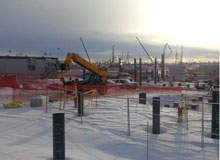
Sturgeon Bitumen Refinery is an innovative project being developed by North West Redwater Partnership (NWRP) in Alberta’s Industrial Heartland, which is located approximately 45km north-east of Edmonton. It is also the first refinery being built in Canada since 1984.
NWRP is a 50:50 joint venture (JV), which was formed in 2010 by North West Upgrading (NWU) and Canadian Natural Upgrading (CNU), a wholly-owned subsidiary of Canadian Natural Resources (Canadian Natural). The refinery will be operated by NWU.
Phase 1 of the three-phase project is scheduled to come online in September 2017. Each phase will enable the conversion of 50,000 barrels of bitumen directly into fuels and other high-value low-sulphur products on a daily basis.
Each phase of the project will capture 1.2 million tonnes of CO2 a year, and enable the reduction of CO2 emissions by approximately 3,500t a day.
Phase 1 was sanctioned in November 2012, and official construction works began in September 2013. The construction is now at its peak, involving approximately 1,300 workers. The regulatory approvals for the remaining phases have also been granted.
Feedstock suppliers for phase 1 of the new refinery in Canada
Qatar Petroleum was to build a further grass roots refinery at Mesaieed Industrial City, Qatar, to process crude oil from the Al Shaheen field situated about 180km north of Doha and operated by Maersk Oil Qatar AS.
Alberta Petroleum Marketing Commission (APMC), an agent of the Province of Alberta, will supply 75% of the feedstock volume, while Canadian Natural will supply the remaining 25% for Phase 1, under a 30-year cost of service toll agreement.
The two suppliers will also sell the refinery products based on their respective percentage of feedstock supply.
Financing for phase 1
The total cost estimated for implementing phase 1 is $8.5bn. Up to 80% of the cost will be financed through a senior debt to be repaid from tolls, and 20% will be financed through equity and subordinated debts.
Sturgeon bitumen refinery phase 1 details
The Sturgeon refinery is designed to produce finished products from Alberta oil sands raw bitumen. It integrates a one-step conversion process, the first of its kind, combining gasification, CO2 capture, and storage into the initial design. It will be the first of its kind to sell CO2 for enhanced oil recovery.
All CO2 captured from the project will be sold to Enhance Energy, which is currently constructing the Alberta Carbon Trunk Line (ACTL); the world’s biggest carbon capture and storage project.
The light ends recovery unit and sulphur plant at the refinery will have a synbit / dilbit bitumen blend processing capacity of 78,000 barrels per day (BPD). The refinery will further include a crude and vacuum unit, a hydrocracker and hydrotreater unit, LC-finer unit, a residue hydrocracker unit, a gasifier, and a 2,000t/d air separation unit (ASU).
Ancillary works include the construction of a reactor assembly building, an electrical substation, feedstock and product tanks, control administration building, a fire hall maintenance and warehouse building, and a water treatment plant. Installation of feedstock and product pipelines and a site communications tower will also be included.
Contractors involved with the Sturgeon bitumen refinery project
Flour Corporation performed the front-end engineering and design study for the project. Fluor Canada Constructors is providing the engineering, procurement, and construction services for the crude and vacuum unit and hydro-processing unit, while the module fabrication services for these units are being performed by Fluor and Supreme Group.
The engineering and procurement services for the sulphur and light ends recovery unit are being performed by UTE Sturgeon, while the module fabrication and construction services are being provided by Tecnicas Reunidas.
The engineering, procurement, and construction management (EPCM) services including module fabrication works for the gasifier. They are being rendered by Air Liquide E&C. The air separation facility at the site will be constructed, owned, and operated by Praxair Canada.
Approximately 25mft3 of hydrogen per day for the project will be supplied by Air Products and its subsidiary Air Products Canada. Water transportation services will be provided by Atco Energy Solutions.
Jacobs Engineering Group is providing the EPCM services for the utilities, the non-process buildings are being constructed by PCL Industrial, and International Cooling Towers is providing the engineering, procurement, fabrication, and installation services for the cooling tower.
The EPCM contractor for the cooling water, waste water, steam, and demineralisation plants is Jacobs Field Services, while the EPCM contractor for the tankfarm, piperack, and flare units is WorleyParsons.
Engineering and procurement services for the pipelines are being provided by CH2M Hill, while the contract for the structural steel erection, fabrication, and assembly of modules for the interconnecting pipe racks was awarded to Aecon Industrial.
The contract for the design, supply, and installation of the field erected tanks was awarded to Horton CBI. The supply and installation services for the pond liners and civil works for the water treatment plant are being performed by GCS Energy Services.
Scaffolding materials will be supplied by Brock Canada, whereas the construction equipment and concrete will be supplied by United Rentals of Canada and Lafarge Canada, respectively.
The cranes for the project are being supplied, operated, and maintained by Sterling Crane and Mammoet Canada Western. The latter is also supplying, operating and maintaining heavy lift equipment at the site. Piling installation works are being performed by Graham Industrial Services and Pacer Mamisiwin.
The design, supply, and installation contract for the outside battery limits (OSBL) main electrical works was awarded to Schneider Electric Canada. The engineering design, fabrication, construction, and operation of the construction power system will be provided by ProTrace Engineering in collaboration with Sumac Fabrication and MMR Canada.
Emerson Process Management is providing automation services and technology for the project, while GE’s Power Conversion business is supplying its Series 9000-RCM large electric motors to power the refinery’s reciprocating compressors.




